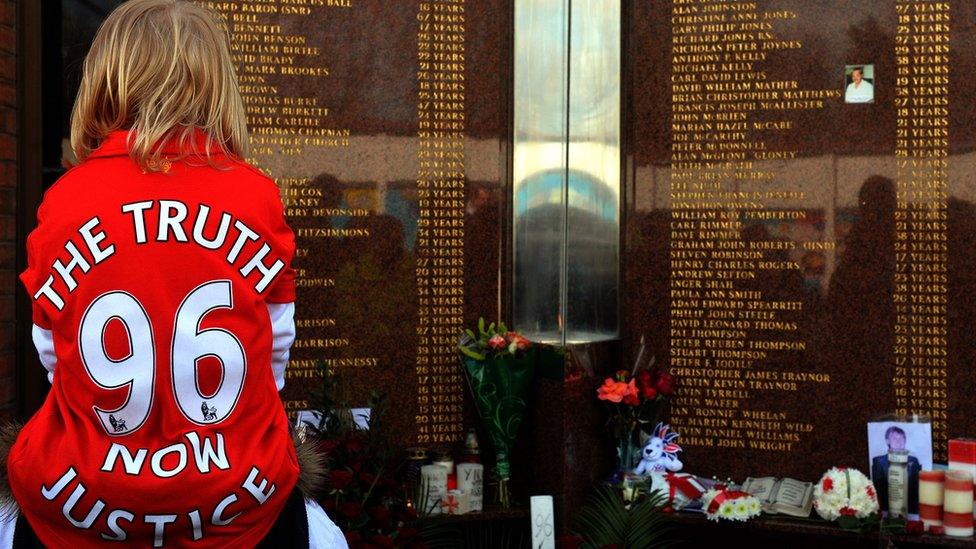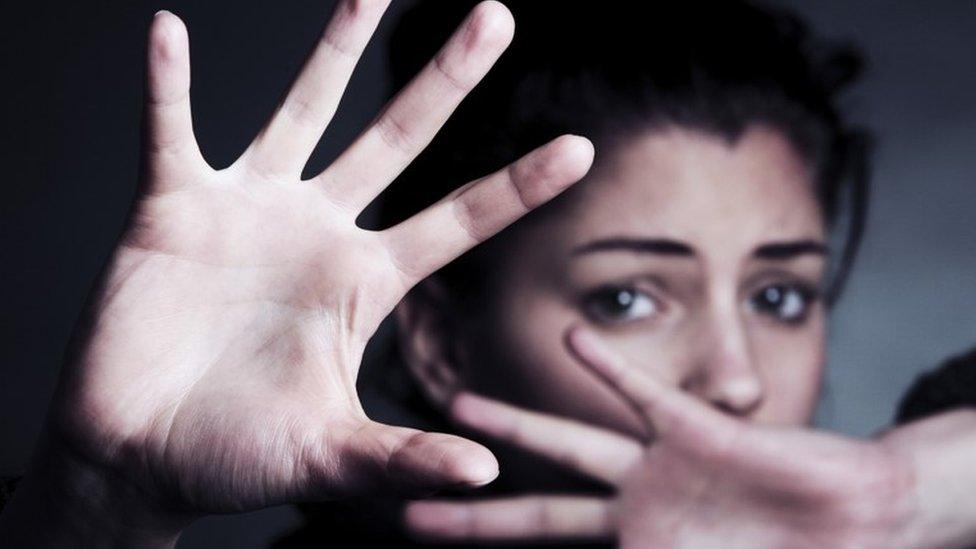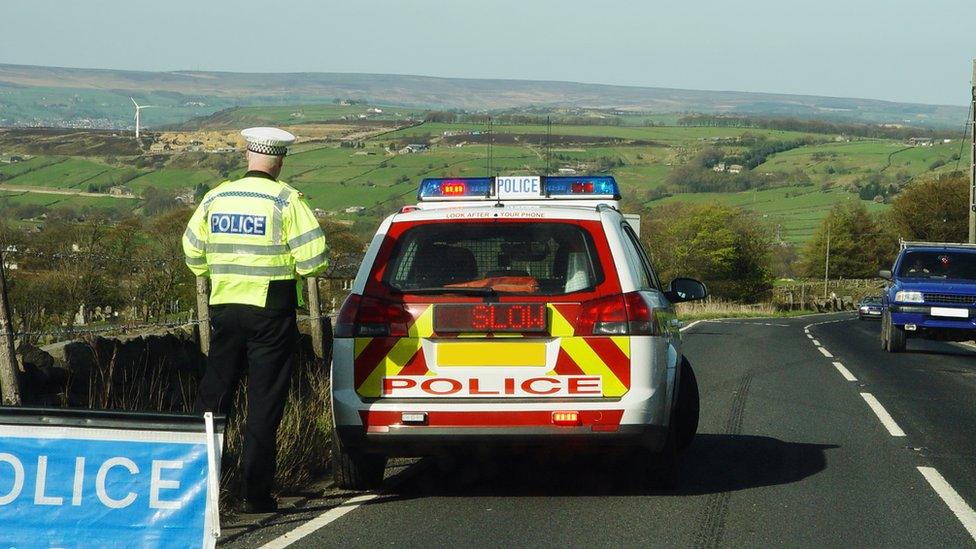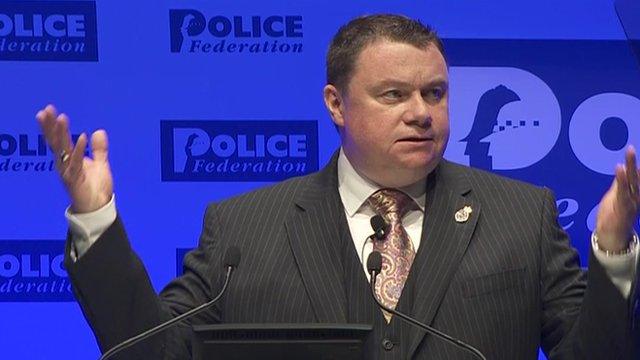Hillsborough must be 'touchstone', May tells police
- Published
Theresa May: "I do not believe there is anyone in this hall who does not recognise the enormity of those verdicts"
The Hillsborough disaster should be a "touchstone" for everything police do, Home Secretary Theresa May has told the Police Federation annual conference.
All officers must "never forget" the 96 fans who died in the April 1989 tragedy and put professionalism at the heart of every decision, she told officers.
In April, the inquests found the victims were unlawfully killed.
Mrs May also said the police watchdog would investigate why laws to tackle domestic violence were underused.
Chief Inspector of Constabulary Sir Tom Winsor would examine why domestic abuse victims were "still being let down and reports are not being taken seriously enough" despite new laws, she said.
Police face domestic abuse cases probe
Special report: Hillsborough disaster
Meanwhile, the process of dismissing suspended South Yorkshire Police (SYP) chief constable David Crompton has begun, the BBC has learned.
Mr Crompton was suspended in the wake of the inquest findings. SYP's Police and Crime Commissioner Dr Alan Billings has completed two stages of an ongoing process to call for him to retire or resign and written to the chief inspector of constabulary.
Toxic poison
Earlier at the conference, police had held a minute's silence to remember the victims.
Fans were crushed at the Leppings Lane end of Sheffield Wednesday's ground at the FA Cup semi-final on 15 April 1989.

Analysis

By Danny Shaw, BBC home affairs correspondent
As the home secretary and Steve White took to the stage for Theresa May's seventh Police Federation conference speech, the sound system started playing Peter and the Wolf.
Was that an ironic reference to Mrs May's address last year when she accused police of "crying wolf" over the impact of budget cuts? Possibly.
However, unlike previous years, when the mood among officers has veered from hostile to venomous, the home secretary was given a polite reception - applauded as she walked to the lectern and clapped as she finished her speech.
The key message she delivered about the need for the Hillsborough tragedy to be a "touchstone" for policing is one that even the most sceptical officer will find hard to resist.

In her speech, Mrs May paid tribute to the families of those who died at Hillsborough and their 27-year fight for justice.
"We must never underestimate how the poison of decades-old misdeeds seeps down through the years and is just as toxic today as it was then," Mrs May told the Police Federation of England and Wales.
"Difficult truths, however unpalatable", must be confronted head-on, she said.
Steve White: "Stand for one minute as we remember the 96 people who died on that sad and tragic day"
"Let's not forget, when we look at Hillsborough, the principal obstacle to the pursuit of justice has not been the passage of time.
"The problem has been that due process was obstructed and the police, the custodians of justice, failed to put justice first.
"Remember Hillsborough," Mrs May told the conference in Bournemouth. "Let it be a touchstone for everything you do."
Police must "never forget" those that died in the disaster and the "27 years of hurt endured by their families and loved ones".
'Integrity at heart'
"Let the hostility, the obfuscation and the attempts to blame the fans serve as a reminder of the need for change," she said.
At the conclusion of the inquests in April into the deaths of the 96 victims of Hillsborough, the jury found match commander Ch Supt David Duckenfield was "responsible for manslaughter by gross negligence" due to a breach of his duty of care.
In unanimous decisions, on all but one of 14 questions about the disaster, the jury found police errors also added to a dangerous situation at the FA Cup semi-final.
The conclusions followed a 27-year campaign for justice by victims' families and loved ones. Concerns emerged from the day of the disaster onwards:
As the emergency happened, Ch Supt Duckenfield told key people a gate had been "forced" by Liverpool fans, a claim reinforced in briefings to media sources.
In the aftermath, police accounts of what happened were amended, in some cases to remove criticism of senior officers.
Despite a 1989 inquiry by Lord Justice Taylor pinpointing a "failure of police control", in 1990 the Director of Public Prosecutions (DPP) said there was "no evidence to justify criminal proceedings".
At the original inquests, the then South Yorkshire coroner Dr Stefan Popper decided the hearing should only investigate events before a cut-off time of 3.15pm - arguing it was unnecessary to look at events beyond this time.
In 2009, the government set up the Hillsborough Independent Panel to review documents relating to the disaster. It reported in September 2012, and a month later, the attorney general applied for the original inquests to be quashed.
In December 2012, the High Court quashed the accidental death verdicts. New inquests were ordered and the home secretary announced a new police inquiry into the disaster.
Concluding her speech to police on Tuesday, the Home Secretary urged police: "Make sure your institutions, whose job it is to protect the public, never again fail to put the public first.
"And put professionalism and integrity at the heart of every decision, every interaction and every dealing with the public you have.
She told police that if they do: "You will renew the model of policing by consent in this country, and you will be the custodians of justice for those who have been denied it for too long."
- Published17 May 2016

- Published17 May 2016

- Published17 May 2016
